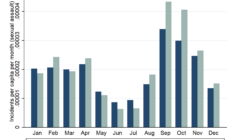New working paper: Alcohol, Behavioral Norms and Sexual Violence on U.S. College Campuses
This paper, joint with Julia Hoefer, is Discussion Paper number 17147 by the Centre for Economic Policy Research.
Abstract:
This paper explores the role of social norms in influencing the incidence of sexual assault, and the contribution of alcohol to such events. We build a decision theoretic model where agents may use alcohol as a “disinhibitor” to undermine social norms discouraging consensual sexual encounters outside marriage. This makes non-consensual encounters more likely. Stronger norms against consensual sex might therefore increase the incidence of non-consensual sex. We test the theory on data from US college campuses, using the presence of Planned Parenthood clinics in the county as an indicator of norms more accepting of consensual sex. Controlling for other factors, colleges in counties with fewer clinics have more incidents of rape and sexual assault in which alcohol is implicated. Colleges affiliated to the National Collegiate Athletic Association also have more such incidents, suggesting that sporting institutions also act as facilitators of a culture of sexual aggression. We provide suggestive evidence from attitudinal surveys and from campus religious affiliation that disapproval of consensual sex may indeed be involved. We explore rival explanations such as reporting and selection biases.


